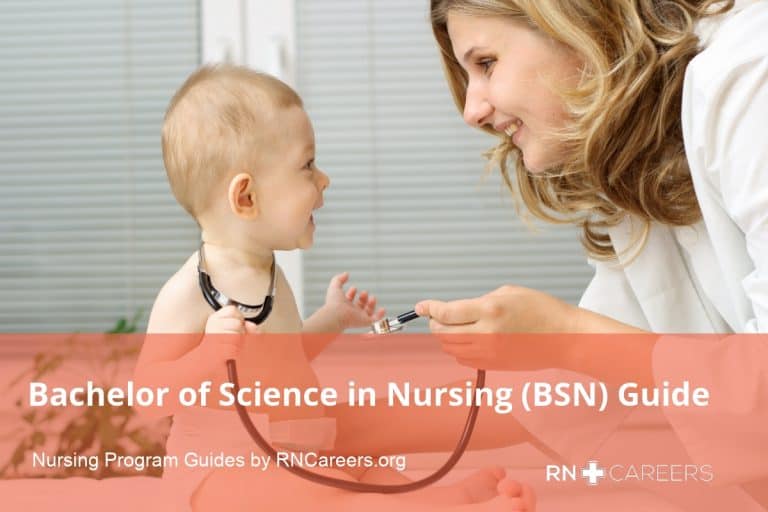What is a Doctor of Nursing Practice?
A Doctor of Nursing Practice (DNP) degree prepares the nurse to be a leader in healthcare and to integrate evidence-based practice into nursing care. A DNP differs from a PhD in that it is a doctorate that is focused on clinical practice whereas a PhD is focused on research. A DNP program will focus more on clinical practice and less on theory and research when compared to a PhD program. Your coursework will prepare you to care for patients at the advanced level, and you will also take courses in systems leadership, quality improvement, and other areas that will prepare you to be a leader.
DNP programs are relatively new. In 2004 schools affiliated with the American Association of Colleges of Nursing (AACN) decided that a doctorate should be required for people who wish to become an APRN. While some NP programs have made this change, certifying bodies do not require a DNP degree for people to become Certified Nurse Practitioners (CNPs). At this time master’s educated NPs are still able to become certified and licensed to practice.
Why Should I Earn a Doctor in Nursing Practice?
Getting your DNP will not only enable you to provide advanced clinical care to patients in a variety of settings, but will also prepare you to be a leader and innovator in healthcare. While master’s prepared Advanced Practice Registered Nurses (APRNs) are still able to get certified and licensed, the DNP degree has been recommended as the terminal degree for APRNs. It is likely that this will become more certain in the future. By getting your DNP you will already be prepared for this transition. If you are seeking a terminal degree in nursing but want to focus on clinical care rather than research, the DNP is for you.
Entrance Requirements for DNP Programs
Entrance requirements may vary a little by university. In general, you can expect entrance requirements similar to what Duke University requires:
- Associates degree in nursing or a bachelor’s degree in nursing: You will need an associate’s degree in nursing (ADN) and your RN or a bachelor’s degree in any field to apply to DNP programs.
- GRE: You must take the Graduate Record Exam (GRE) and submit scores to your potential schools.
- Complete pre-requisites: You may need to take certain pre-requisites such as biology, statistics, and chemistry depending on what you majored in during your bachelors.
- GPA: Some programs will require that you have a GPA above a 3.0 from your post-secondary education.
- Letters of reference: Most DNP programs will require 1 or more letters of reference.
- Submit applications: Each school you apply to will have its own application that you need to complete. You will have to answer basic questions about yourself, write 1 or more essays and/or a personal statement, and submit materials such as past transcripts. You will likely also need to pay a processing fee.
- Interview: Some DNP programs will interview applicants prior to making admission decisions.
What Pathways Exist for Earning My Doctor in Nursing Practice?
There are multiple ways to become a DNP prepared nurse depending on your educational and professional background. Even if you are not a nurse or do not have your BSN you can earn your DNP.
- RN to DNP: As an ADN prepared RN you can apply for DNP programs that will provide you with the education and training to earn both your BSN and DNP.
- BSN to DNP: If you have your BSN you can earn your DNP in about 4 years.
- Bachelors to DNP: A Direct Entry DNP program enables you to earn your DNP even if you have a bachelors in something other than nursing. During a Direct Entry program, you will be trained first as a nurse and then will enter the DNP program. You will likely have to have taken courses in anatomy and physiology, biology, chemistry and more prior to applying. A Direct Entry DNP program will take you about 4 to 5 years to complete.
- MSN to DNP: A DNP program will take about 2 to 3 years if you already have your master’s in nursing.
Online DNP Programs
In an effort to make higher education more accessible for the busy adult online programs have become popular in many professions. Nursing education has jumped on board and offers online programs to people interested in earning their DNP. These programs are offered by universities accredited by the ACEN or CCNE. Online programs enable you to complete your assignments and class discussions in an online format. Online classes offer more flexibility for the busy student. Your school can also help you organize clinical experiences in a location convenient for you and with preceptors who work within your chosen population and specialty.
What DNP Specializations Are Available?
Nurse Practitioner (NP): As an NP you will provide direct clinical care including assessing, diagnosing, treating, and following up with patients. You will focus in one of the following populations:
- Family Nurse Practitioner (FNP)
- Women’s Health Nurse Practitioner (WHNP)
- Psychiatric Mental Health Nurse Practitioner (PMHNP)
- Primary Care Pediatric Nurse Practitioner (PCPNP)
- Acute Care Pediatric Nurse Practitioner (AC PNP)
- Adult-Gerontology Primary Care Nurse Practitioner (AG-PCNP)
- Adult-Gerontology Acute Care Nurse Practitioner (AG-ACNP)
- Neonatal Nurse Practitioner
Clinical Nurse Specialist (CNS): As a CNS you will provide specialized nursing care to patients that may include diagnosing and prescribing medication depending on where you work. See our CNS guide for more details.
Certified Registered Nurse Anesthetist (CRNA): You will be able to independently care for and provide anesthesia and pain medication to patients in all 50 states.
Certified Nurse Midwife (CNM): You will provide comprehensive care to women throughout their lifespan with the ability to prescribe medication in all 50 states.
What Will I Study in My DNP Program?
DNP program curriculums can vary by university and what type of APRN you decide to become. There are certain required courses that will be the same across all DNP programs, and others will be specific to your specialty or university. You can expect to take some of the following courses that are offered at Vanderbilt University regardless of your school or specialty:
- Nursing Theory
- Quality Improvement and Patient Safety
- Advanced Pharmacology
- Statistics
- Ethics in Nursing
- Advanced Nursing Practice
- Evidence-Based Practice
- Advanced Pathophysiology
- Nursing Concepts
DNP Clinical Requirements
Structured and supervised clinical experiences during your DNP education are important in making sure that you are being properly trained and can safely provide patient care when you go into practice. Hours can vary depending on your university, but most BSN to DNP programs require 1000 hours of clinical care. If you are not yet an RN, you will have more clinical hours to complete. Usually about 500 to 600 of these hours are required for certification depending on what type of APRN you become. The remaining clinical hours are required for you to earn your DNP. Your clinical experience will be hands on and in a setting that will prepare you for your population focus and specialty. You will be supervised by an APRN in your chosen field who will train you and help you master your clinical skills in a safe setting. This will enable you to enter practice as a safe provider and qualified learner.
How Much Will a DNP Degree Cost?
DNP program costs are usually based per credit hour. Price will vary depending on whether or not you are attending a private university. Additionally, there are often scholarship opportunities and grants that students can receive. If you take out loans to fund your education, there may be opportunities in your future to get these paid for. The following two universities provide good examples of what a private and state DNP program might cost assuming that you take 15 credits per semester:
- University of Texas: $1390/credit or for in state residents $14,000/year
- Duke University: $1703/credit or $50,000/year
Loan forgiveness opportunities such as the Nurse Corps Loan Forgiveness program and the Public Service Loan Forgiveness program can be incentives to get nurses to work in medically underserved areas. It can also help people take on the initial cost of an advanced degree in nursing by knowing that they have additional options to help pay it back later. Below are some other ways that you can help pay for your DNP education costs:
- Individual Hospital Repayment Programs
- Perkins Loan Cancellation
- Military Programs
- How to Pay for Nursing School
- Scholarships
Each state may also have their own way of helping you pay off your loans.
How Much Do Nurses With a DNP Earn?
Like any profession your salary will vary depending on your specific field, the location where you work, and your experience. DNP educated APRNs can expect to make about the same as master’s educated APRNs. In some cases, you may make about $10,000 more annually than a master’s educated APRN within your specialty and with the same level of experience, but a higher salary is not guaranteed with a DNP degree. As with master’s educated APRNs you will have the highest salary if you are a CRNA. According to the Bureau of Labor Statistics CRNAs make an average salary of $169,450. Other APRN roles have high salary prospects as well. CNMs make an average of $99,770 per year, and NPs make an average of $100,900 annually. CNS salary can vary broadly at anywhere from $68,000 to $101,000. If you work in an urban area you will likely have a higher salary than if you worked in a rural one, and as you gain experience you can begin to negotiate a higher salary.
Doctor of Nursing Practice Resources
- American Association of Colleges of Nursing
- The National Organization of Nurse Practitioner Faculties
- Doctors of Nursing Practice
- Evidence Based Nursing Journal
Denisco, S. M., Barker, A. M., (2016). Advanced practice nursing: Essential knowledge for the profession. Burlington, MA: Jones and Barlett Learning.
- About the Author
- Latest Posts
Lauren is a Registered Nurse and Women’s Health Nurse Practitioner who works in an OB/GYN clinic in the Boston area. She completed a Direct Entry MSN program at Boston College in May 2017 after obtaining a BS in Forensic Science and a BS in Biology from the University of New Haven, so she has special awareness of how confusing the many paths to nursing can be! She is passionate about enhancing and clarifying the nursing role globally as well as combatting human trafficking from a public health standpoint. In her free time Lauren enjoys writing and traveling.





![Paramedic to RN Bridge Programs: Online RN Options for [year] 6 Paramedic To Rn Bridge Programs: Online Rn Options For 2024](https://www.rncareers.org/wp-content/uploads/2018/11/paramedic-to-rn.jpg)

